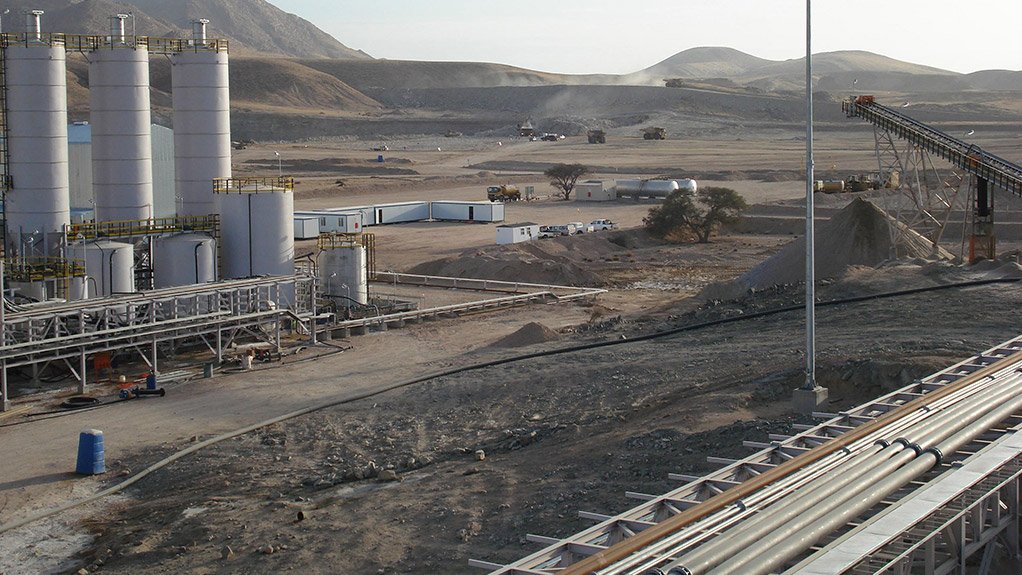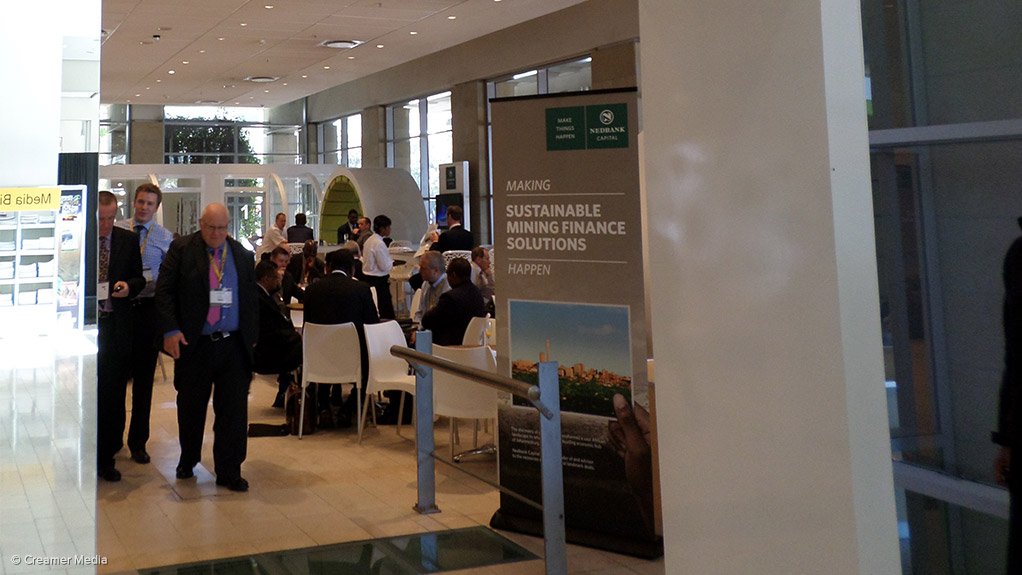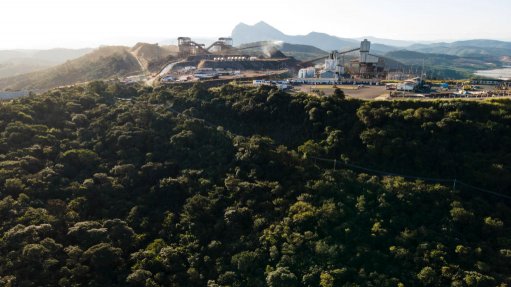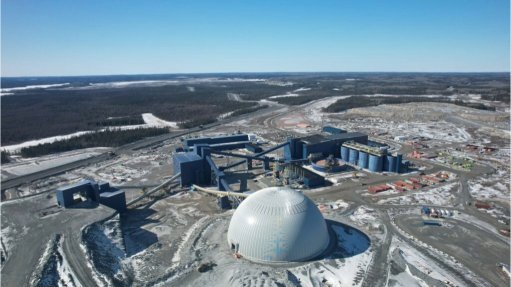Bank seeks new African investment destinations



LANGER HEINRICH MINE Nedbank and Standard Bank have jointly refinanced Paladin Energy’s Langer Heinrich uranium mine, in Namibia
Photo by Bloomberg
NEDBANK NETWORKING LOUNGE Despite the challenges facing South Africa, it contains more than half of the top 100 richest mines in Africa
Investment banking services provider Nedbank Capital is seeking opportunities to invest in several greenfield gold projects in Africa, specifically in Ghana, Burkina Faso and Tanzania.
Speaking to Mining Weekly at the Investing in African Mining Indaba, Nedbank Capital mining and metals investment banker Paul Miller said the bank was also considering investment opportunities in Mozambique’s nascent coal industry.
One of Nedbank Capital’s recent endeavours is its joint venture with banking firm Standard Bank to refinance uranium miner Paladin Energy’s Namibia-based Langer Heinrich uranium mine, in January, and refinancing Paladin’s Kayelekera uranium mine, in northern Malawi, which led to a $59-million reduction in the miner’s debt repayments in the 2014/15 calendar years.
“Further, we provided $20-million in finance capital for the expansion of Aim-listed mineral sands producer Sierra Rutile’s projects, in Sierra Leone, in August. We also partnered with financial services provider Rand Merchant Bank in June to assist in financing $88-million for TSX- and Aim-listed gold company Aureus Mining’s $100-million development for its New Liberty Gold mine, in Liberia,” said Miller.
He further noted that Nedbank Capital worked with Standard Bank and financial services provider Caterpillar Finance to raise $170-million to finance ASX-listed mineral sands developer Base Resources’ Kwale mineral sands project, in Kenya, in June 2012.
Miller added that Nedbank Capital was also seeking to finance greenfield projects outside Africa, such as in Australia and Canada.
“We consider any investments outside Africa as part of an African strategy for greater, long-term investment in the continent, as Toronto, Vancouver and Perth are significant mining business communities that spearhead financing and mining project development in Africa. Therefore, Nedbank Capital believes that, to build networks and establish credibility in these mining communities, it also has to service these locations’ mining interests,” he explained.
Miller pointed out that 2014 was an election year for South Africa and he believed that investors and mining houses would be keeping a close eye on the political and policy frameworks that developed before and after the election, as this would impact directly on industry confidence.
“We expect that the proposed amendments to the Mineral and Petroleum Resources Development Act will be passed during the year and that the consequences will have major ramifications for the industry, specifically with regard to the classification of certain types of resources.
“For instance, classifying coal as a strategic resource could result in limits or even bans on the export of such commodities. Such an action could have profoundly negative consequences for the local mining industry, especially from an investment point of view,” he stated.
Further, Miller highlighted that mining companies and potential investors would focus more on the state of labour relations in the country this year, as violent and prolonged strikes had impacted negatively on the industry in the last five years.
He lamented that South Africa’s recent his- tory of violent labour unrest and increasing operational expenses had made it less attractive as an investment destination and that investors were increasingly seeking out less developed countries, such as Mozambique, Botswana and Ghana, for new project development instead.
“This is a worrying trend for the South African mining industry, as the country has always relied on foreign investment as its main source of funding for new mining ventures. South Africa does not have the large capital base that is required to finance new large greenfield mining operations,” he stressed.
Moreover, he pointed out that State-owned power utility Eskom has for some years discussed the requirement to establish ten new coal mines in the next five years at a collective cost of about R100-billion.
“South Africa will have to find creative ways to attract such a large amount of foreign investment to ensure that these ambitious ventures are brought to fruition,” he stated.
Miller emphasised that, despite the various challenges that the South African mining industry had been facing, it remained the largest mining sector on the African continent.
“We should not underestimate the size and success of the local mining industry. South Africa has more than half of the top 100 richest mines in Africa,” he noted.
Miller added that Nedbank Capital financed significantly more South African projects than projects outside the country. However, he acknowledged that most of the South African projects were brownfield projects, which mostly required acquisition financing or the financing of black economic-empowerment deals.
“We are, in fact, fortunate if we can finance a single greenfield project in South Africa in a year, while, conversely, most of the projects that the bank finances in other parts of the continent are greenfield projects,” he said.
In addition, Miller pointed out that South Africa boasted well-developed upstream supply and services industries for the mining sector.
“...we service several major mining companies that have procurement offices in Johannesburg, despite them having no active operations in South Africa. Nonetheless, these companies are aware that if they need to buy mining equipment or services, these can all be bought at a competitive price in South Africa,” he stated.
He also stressed that the mining equipment and services sector must be assisted by government in developing further, particularly, if the current low-growth trend in the local mining industry continues.
“South African companies are establishing more of a presence in projects taking place elsewhere in Africa. Nedbank Capital has worked closely with South African consulting and engineering firms on several projects in Africa,” noted Miller.
Comments
Press Office
Announcements
What's On
Subscribe to improve your user experience...
Option 1 (equivalent of R125 a month):
Receive a weekly copy of Creamer Media's Engineering News & Mining Weekly magazine
(print copy for those in South Africa and e-magazine for those outside of South Africa)
Receive daily email newsletters
Access to full search results
Access archive of magazine back copies
Access to Projects in Progress
Access to ONE Research Report of your choice in PDF format
Option 2 (equivalent of R375 a month):
All benefits from Option 1
PLUS
Access to Creamer Media's Research Channel Africa for ALL Research Reports, in PDF format, on various industrial and mining sectors
including Electricity; Water; Energy Transition; Hydrogen; Roads, Rail and Ports; Coal; Gold; Platinum; Battery Metals; etc.
Already a subscriber?
Forgotten your password?
Receive weekly copy of Creamer Media's Engineering News & Mining Weekly magazine (print copy for those in South Africa and e-magazine for those outside of South Africa)
➕
Recieve daily email newsletters
➕
Access to full search results
➕
Access archive of magazine back copies
➕
Access to Projects in Progress
➕
Access to ONE Research Report of your choice in PDF format
RESEARCH CHANNEL AFRICA
R4500 (equivalent of R375 a month)
SUBSCRIBEAll benefits from Option 1
➕
Access to Creamer Media's Research Channel Africa for ALL Research Reports on various industrial and mining sectors, in PDF format, including on:
Electricity
➕
Water
➕
Energy Transition
➕
Hydrogen
➕
Roads, Rail and Ports
➕
Coal
➕
Gold
➕
Platinum
➕
Battery Metals
➕
etc.
Receive all benefits from Option 1 or Option 2 delivered to numerous people at your company
➕
Multiple User names and Passwords for simultaneous log-ins
➕
Intranet integration access to all in your organisation




















